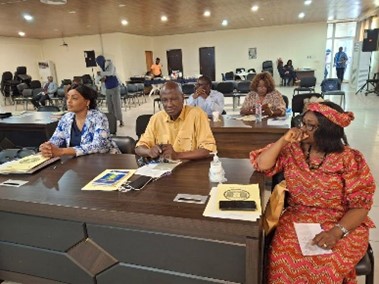The National Elections Commission (NEC) of Liberia embarked on a crucial two-day workshop from May 22nd to 23rd, 2025, focused on developing a new six-year Strategic Plan for the period 2025-2031. This initiative, titled the Building Resources in Democracy, Governance and Elections (BRIDGE) introductory workshop, brought together 25 key NEC officials, including the Board of Commissioners and senior managers. The primary objective was to establish a clear purpose and process for shaping the NEC’s strategic direction for the next six years, ensuring a unified vision and strengthening the institution’s commitment to this vital undertaking. The workshop emphasized the importance of leveraging the lessons learned from the 2023 elections to inform a proactive strategy that extends beyond the upcoming 2029 general elections, ultimately fostering the NEC’s long-term success and sustainability.
The workshop, facilitated and supported by the UNDP Liberia Electoral Support Project (LESP) with co-funding from the European Union, Ireland, Sweden, and the European Partnership for Democracy (EPD), provided a platform for the NEC leadership to delve into the intricacies of strategic planning. Participants explored various concepts related to this crucial process, examining different steps, processes, tasks, and responsibilities involved. Furthermore, they engaged in discussions surrounding key partnerships essential for the successful implementation of the strategic plan. This comprehensive approach aimed to equip the participants with a deeper understanding of strategic planning and provide a well-defined roadmap for effectively developing the NEC’s new strategic direction.
Commissioner Floyd Oxley Sayor, in his opening remarks, underscored the significance of applying the acquired knowledge and skills to formulate a comprehensive strategic plan for the NEC. He emphasized the importance of incorporating the experiences and lessons learned from the 2023 elections to shape a forward-looking strategy that considers not only the 2029 general elections but also the long-term future of the institution. This proactive approach, according to Commissioner Sayor, is crucial for ensuring the NEC’s continued success and sustainability. Katherine Green, Chief Technical Advisor for the UNDP electoral project, echoed this sentiment, highlighting the critical role of strategic planning for an election management body. She described it as a structured approach to managing the organization’s long-term goals and objectives within its mandate of conducting elections.
NEC Chairperson Davidetta Browne Lansanah emphasized the crucial role of partnerships and stakeholder engagement in the successful realization of the NEC’s strategic plan. She highlighted the value the NEC places on collaborations with external stakeholders and actors, recognizing their significant contribution to achieving the Commission’s mandate. Chairperson Lansanah specifically highlighted the importance of partnerships in pursuing development strategies for electoral reform, boundary delimitation, and other activities aimed at improving voter registration and the overall conduct of elections in Liberia. This collaborative approach, she emphasized, is essential for strengthening the electoral process and ensuring its effectiveness and integrity.
The new strategic plan is intended to encompass a refreshed vision for the NEC, reinforcing its commitment to continuous improvement, institutional learning, and inclusive electoral processes. It aims to foster a culture of excellence in election administration, ensuring that the NEC operates at the highest standards of professionalism and efficiency. In the months following the workshop, the NEC will undertake a series of consultations, technical assessments, and internal reviews. This comprehensive approach will enable the identification of priority reforms that align with available resources and institutional capacities, ensuring that the strategic plan is both ambitious and achievable.
The UNDP Liberia Electoral Support Project (LESP), a collaborative effort co-funded by the European Union (EU), Irish Aid, the Embassy of Sweden, and UNDP, plays a crucial role in supporting national institutions and processes that promote a more inclusive and accountable democracy in Liberia. The project, managed and coordinated by UNDP, is implemented in partnership with UN Women and the Netherlands Institute for Multi-Party Democracy (NIMD). This collaborative approach leverages the expertise and resources of multiple organizations to strengthen democratic governance in Liberia, with a particular focus on enhancing the electoral process and promoting inclusivity and accountability. The BRIDGE workshop, facilitated by LESP, represents a key component of this broader effort to support the NEC in developing a robust and forward-looking strategic plan.














